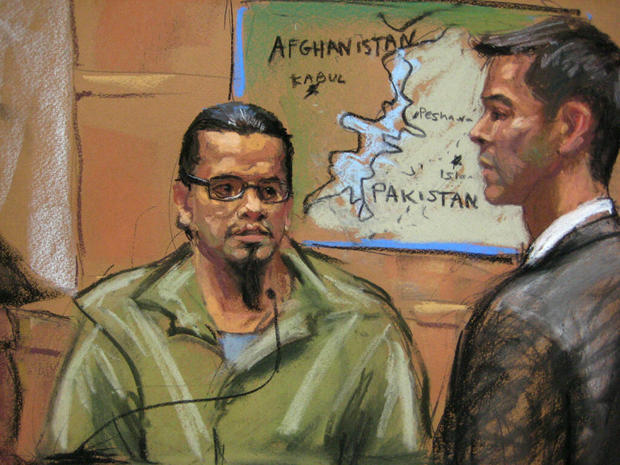American al Qaeda offering insights at NYC trial
(CBS News) NEW YORK - The U.S. we may have learned a great deal from what was found in Osama bin Laden's compound on paper or in hard drives. But over the last two weeks, in a federal courtroom in Brooklyn, CBS News correspondent John Miller reports we have gotten a different window into bin Laden's thinking from some of the very terrorists he gave orders to.
Many have heard of Richard Reid, the so-called shoe bomber who was caught trying to blow up a Miami-bound plane in late 2001. Fewer people have heard of Saajid Badat, the other shoe bomber. He changed his mind and never boarded his flight, but in a video deposition, he told prosecutors of al Qaeda's plan.
"It was to take this shoe on board an American airline and then detonate it," Badat said, adding he understood that could mean killing potentially hundreds of innocent people.
Badat also told of meeting Osama bin Laden.
"I was called to meet with Osama bin Laden in person. It was just the two of us in the room," Badat said.
Bin Laden told Badat the mission was about more than crashing a plane; it was to crash the airline industry.
"He said that the American economy is like a chain. If you break one ... one link of the chain, the whole economy will be brought down," Badat said.
Badat's deposition was played at a trial about three New York men charged with plotting to bomb the New York City subways in 2009.
Homegrown terrorist shows his face in BrooklynWould-be subway suicide bomber Najibullah Zazi speaks
The plot that almost happened
Domestic terror plots down after terror leader Anwar al-Awlaki's death
Another al Qaeda recruit from New York, Bryant Vinas, testified he plotted to bomb a Wal-Mart store and the Long Island Railroad to cause the "big economic hit" al Qaeda leaders wanted.
"They understand the psyche of the West -- that even a small plot that's successful will cause huge economic disruption," said Don Borelli, a former FBI agent who was involved in the investigation.
Al Qaeda is weaker than it was a few years ago, but is still trying to recruit Westerners.
"This is the crown jewel for al Qaeda -- to be able to have somebody they can trust, they can train, and then re-insert back into their homeland and carry out an attack essentially whenever they deem appropriate," Borelli said.
That point was underscored in this trial. The three New York men charged in the subway plot had joined al Qaeda to fight American soldiers in Afghanistan. But when al Qaeda leaders learned they were Americans with U.S. passports, they asked them to go home and carry out an attack on New York City. The jury began deliberations in this case Monday.

